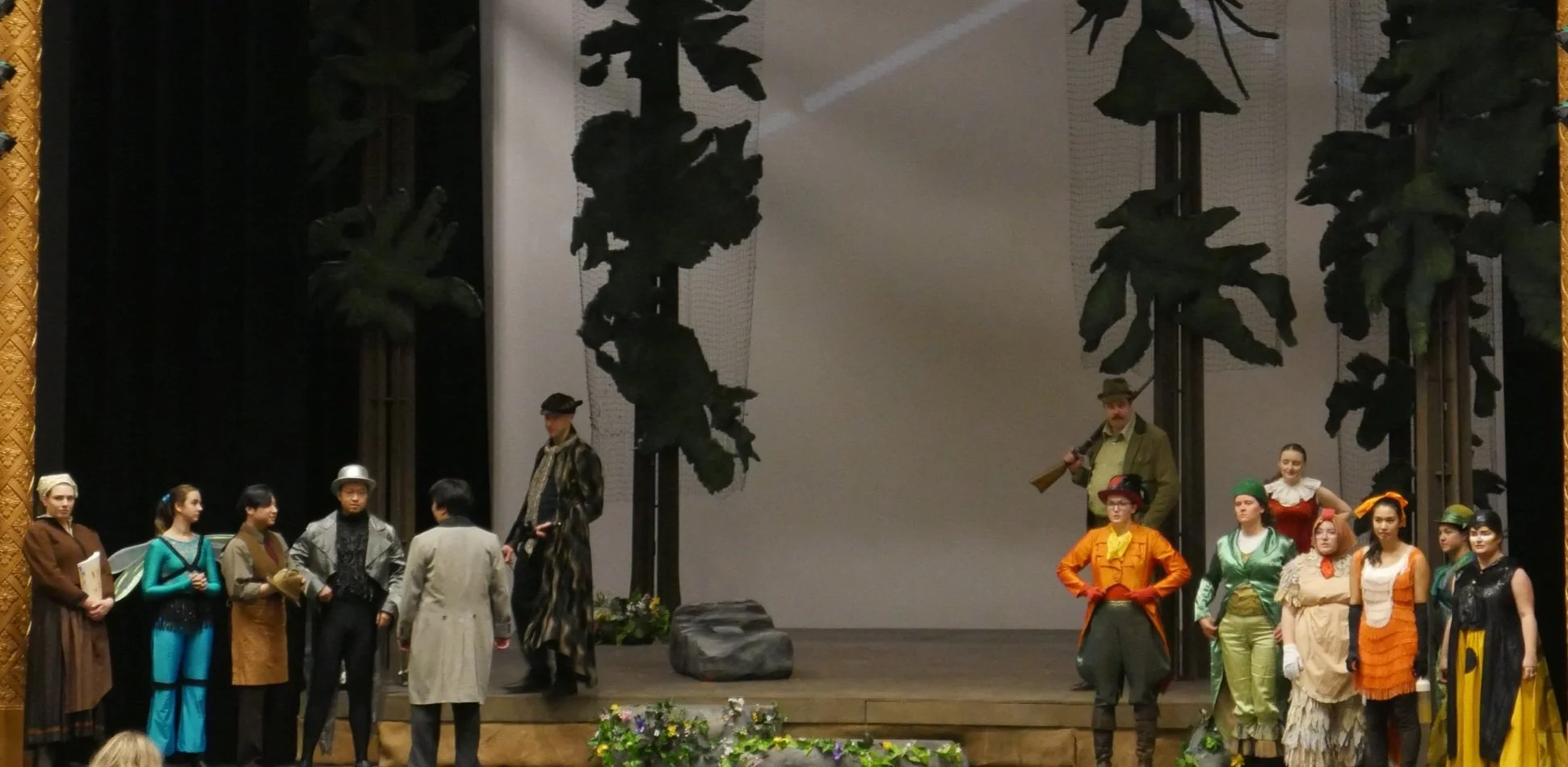The Cunning Little Vixen sopranos revel in UBC Opera's rare performance of Janáček’s bittersweet fable
It’s full of animals, but performers have discovered how human the lushly orchestrated work is
Sopranos Mariana Iguavita and Emma Jang
UBC Opera presents The Cunning Little Vixen from November 2 to 5 in the Old Auditorium
OF ALL THE CHARACTERS that UBC Opera sopranos Emma Jang and Mariana Iguavita are likely to sing in their careers, this may be the only time they get to perform the part of a female fox—one based originally on a comic strip. And sung completely in Czech.
That may be part of the reason both are relishing the chance to play the title character of Leoš Janáček’s rarely performed, allegorical forest fantasy The Cunning Little Vixen—the two women alternating the role in the UBC Opera production directed by Nancy Hermiston.
“It's a bit of a departure for me,” says Jang, who’s completed her Masters in Music in opera performance at UBC. “I get to dig into the instinctive side of the character and there's not so much composure in it actually, so it’s nice to let loose a little bit onstage.
“I know I didn’t ever think I’d be inciting a rebellion onstage,” she adds, laughing, “or urinating on a badger’s house!”
Still, the vixen, along with a forest and barn full of other creatures in the Czech composer’s opera, is disarmingly human—and that’s the point in this bittersweet fable. Janáček based the work, first performed in 1924, on a daily comic strip of that era that followed the adventures of a female fox and a human forester. In The Cunning Little Vixen, the young fox is captured by the forester and taken into humiliating captivity as a pet, but she incites a barnyard rebellion and escapes back into the forest, discovering love and the smaller pleasures of family life. And so the work is not quite the sweet kiddie fairy tale it might sound like, growing into a sometimes comic, sometimes tragic meditation on lust, love, brutality, contentment, and the fleeting cycle of life. Though Janáček studied foxes in-depth when creating the opera, it is said the vixen character was inspired by the composer’s own unrequited love for the much younger, married Kamila Stösslová.
“I think this opera is very human in a way–even if we have animals all around,” says Iguavita in a separate call. “It’s a very honest opera full of human conflict, passion, emotions, obsession, love. So if you let yourself connect with it, you can relate a lot to the fox, a hen, a horse, or many characters that you wouldn’t normally relate to in real life.
“That's the way I relate to it: as a woman you always try to gain independence, gain respect, try to be strong,” adds the fourth-year music student. “And I think the vixen's ultimate goal in her life was to be that: independent, live her own life under her own terms. So I connect really deeply to all that.”
A dress rehearsal for UBC Opera’s The Cunning Little Vixen.
Jang is fascinated by the symbolic implications of the older, male forester taking the much younger vixen from a place where she’s free. “It’s interesting to watch how his love for her is marred by objectification,” she observes. “He sees her as something beautiful, but he almost resents her for having a freedom that he doesn’t have.”
Finding the deeper levels in that relationship, while still trying to capture the mannerisms of a fox (Iguavita says she’s been studying the animal’s movement and behaviour) comes with its challenges. Now add to that the fact that neither soprano had ever performed a full opera in Czech before. As honed opera students, they of course are used to learning Italian, German, and French for traditional roles. But Czech is rarely sung in opera, with unique consonant sounds. Luckily, they’ve had huge amounts of help on the nuances of the lyrics and their pronunciation from conductor Norbert Baxa, who is Czech.
“At the beginning I was very overwhelmed by the language,” admits Iguavita. “Now I think it is one of my favourite languages to sing.”
It helps that the music is so vibrant, with its rich, swelling orchestrations and signature flourishes from the Moravian folks songs, from the eastern part of what is now the Czech Republic, that Janáček loved so much. (Get an earful below from a Seattle Opera production to hear what we mean.)
Design-wise, Jang reports that, fittingly, the costumes are a mix of the human and animal: in the case of the Vixen, she sports an orange, fringed flapper-style dress with white on the chest, along with thigh-high black boots, black tights, and black fingerless gloves.
In fact, the entire production is a “visual feast for the eyes”, Jang explains.
“For anybody who has never seen a Czech opera this is a wonderful, wonderful one to start with,” Jang adds. “And the music is so lush that even if you don’t understand the words you’ll relate to it—though of course there are surtitles.”















